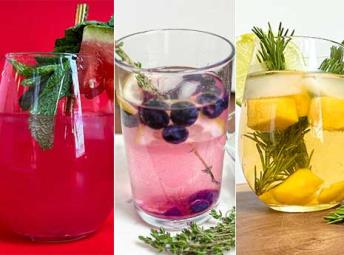Another group of phytochemicals are called flavonoids. They are in many plant foods, including tea, apples and onions. Epidemiological surveys of large groups of people indicate those who regularly consume chocolate consume more of these health-protective flavonoids than non-chocolate eaters. This reduces their risk of heart disease. In the Netherlands, elderly men who routinely ate chocolate-containing products reduced their risk of heart disease by 50 percent and their risk of dying from other causes by 47 percent. (2)
Cocoa increases blood flow to the brain. If this means you can process information better and faster—like calculate your split times or help your kids with their math homework—wouldn't that be a great excuse to enjoy chocolate?
Many parents keep chocolate away from their children, thinking chocolate makes them hyper. No research to date supports that claim. The party or special event that surrounds the chocolate likely triggers the hyperactivity. (3)
Chocolate is yummy. Most athletes love chocolate. Chocolate lovers don't want sugar-free or fat-free chocolate. They want the 100 percent real stuff. That's because consumers buy benefits, not products. Being yummy is a huge benefit.
During the recession in 2009, sales of Hershey's chocolates increased. Is that because worried people bought a moment of yummy, cheer-me-up chocolate? Or, did they simply settle for a bag of less expensive Hershey's Kisses instead of a box of pricey Godiva Chocolates? Regardless, chocolate seems to fit every mood—be it happy, sad, tired or celebratory.
Flavanol-rich cocoa may help reduce muscle soreness. Studies with athletes who performed muscle-damaging downhill running and then consumed a cocoa-based carbohydrate and protein beverage experienced less muscle damage and felt less muscle soreness. (4)
Although the chocolate used in flavoring milk lacks the health-protectors found in dark chocolate, the yummy flavor makes chocolate milk a popular recovery drink. The sweetened chocolate offers carbs to refuel muscles; the milk offers protein to build and repair muscle. Plus, milk boosts intake of calcium and vitamin D, needed for strong bones.
Conclusion
Despite all this good news about chocolate, it is still just a candy and not a life-sustaining food. Yet, it does provide pleasure—and pleasure is certainly part of a health and wellness program, right?
The trick is to enjoy dark chocolate as part of the 100 to 150 "discretionary" sugar calories that can be part of your daily sports diet. As for me, I'll enjoy my dark chocolate during a long hike or bike ride. It tastes better than most engineered sports foods and nicely fuels both my body and my mind.
Chocolate Lush
This low-fat brownie pudding forms its own sauce during baking. It's a tasty treat for when you are hankering for a chocolate fix and a yummy way to add a little dark chocolate to your sports diet. This recipe is one of many in my Sports Nutrition Guidebook.
- 1 cup flour,preferably half white, half whole wheat
- 3/4 cup sugar
- 2 tablespoons unsweetened dry cocoa
- 2 teaspoons baking powder
- 1 teaspoon salt
- 1/2 cup milk
- 2 tablespoons oil, preferably canola
- 2 teaspoons vanilla
- 3/4 cup brown sugar
- 1/4 cup unsweetened dry cocoa
- 1-3/4 cups hot water
Optional: 1/2 cup chopped nuts.
1. Preheat the oven to 350°.
2. In a medium bowl, stir together the flour, white sugar, 2 tablespoons cocoa, baking powder, and salt; add the milk, oil, and vanilla. Mix until smooth. (Add nuts.)
3. Pour into an 8x8" square pan that is nonstick, lightly oiled, or treated with cooking spray.
4. Combine the brown sugar, 1/4 cup cocoa, and hot water. Gently pour this mixture on top of the batter in the pan.
5. Bake at 350° for 40 minutes, or until lightly browned and bubbly.
Yield: 9 servings
Total calories: 2,100
- Calories per serving: 230
- Nutrients percent Grams
- Carbohydrate 46 grams
- Protein 3
- Fat 4
Related Articles:
- 5 Ways Chocolate Boosts Your Workouts
- Would Chocolate Motivate You to Run?
- Raw Chocolate Cherry Mini Tarts
 Find more nutrition tips.
Find more nutrition tips.
Nancy Clark, MS RD CSSD (Board Certified Specialist in Sports Dietetics) counsels casual and competitive athletes in her private practice at Healthworks, the premier fitness center in Chestnut Hill MA (617-383-6100). Her Sports Nutrition Guidebook, new Food Guide for Marathoners, and Cyclist's Food Guide are available at www.nancyclarkrd.com. Also see www.sportsnutritionworkshop.com for information about her online workshop.
References
- Fisher ND, Hollenberg NK. Aging and vascular responses to flavanol-rich cocoa. J Hypertens. 24(8):1575-80, 2006.
- Buijsse B, Feskens EJ, Kok FJ, Kromhout D. Cocoa intake, blood pressure, and cardiovascular mortality: the Zutphen Elderly Study. Arch Intern Med. 27;166(4):411-7, 2006.
- Wiles NJ, Northstone K, Emmett P, Lewis G 'Junk food' diet and childhood behavioural problems: results from the ALSPAC cohort. Eur J Clin Nutr. 2009 Apr;63(4):491-8.
- McBrier NM, Vairo G, Bagshaw D et al., Cocoa-based protein drink decreases CK levels and perceived soreness following exhaustive exercise. J Strength and Conditioning Research 2010, manuscript in press.
- 2
- of
- 2







Discuss This Article